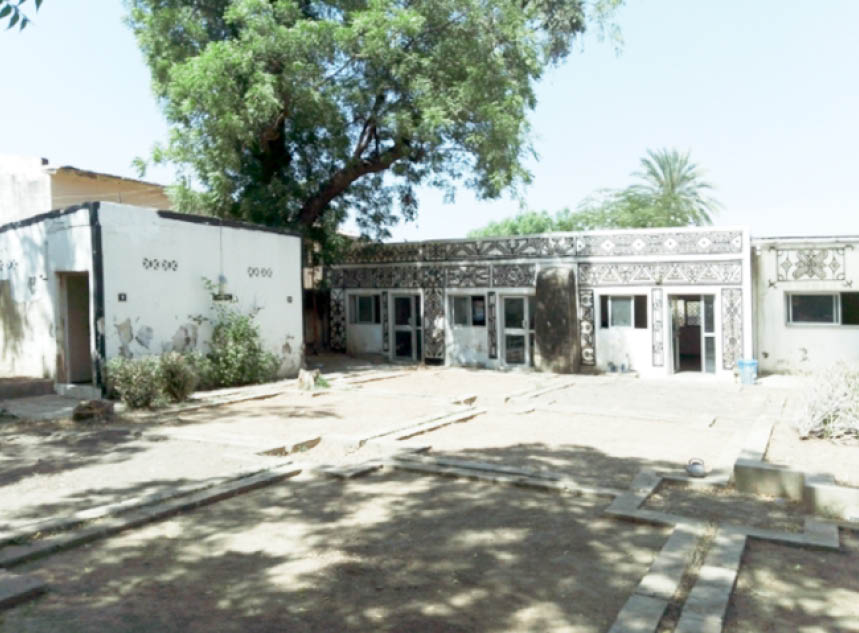Kano’s British Council building in state of disrepair
One of Kano’s magnificent historical buildings, which architectural design depicts the peoples’ culture and religion has been left in a state of disrepair. The over 60 years building, which once housed the British Council is one of the oldest structures used by British colonial masters for administrative and other cultural relations in Kano State. The […]

Part of the building
One of Kano’s magnificent historical buildings, which architectural design depicts the peoples’ culture and religion has been left in a state of disrepair.
The over 60 years building, which once housed the British Council is one of the oldest structures used by British colonial masters for administrative and other cultural relations in Kano State.
The place, according to history, was given to Britain in the early 1940s during the reign of the then Emir of Kano, Alhaji Abdullahi Bayero and has been occupied by them until they recently relocated to another place at the peak of Boko Haram insurgency due to security reasons.
The edifice, which was built with mud using traditional Hausa architectural design, houses four mini-conference rooms, a few offices and some parking spaces.
When the Britons were using it, students as well as other people use some of the libraries in it, watch movies and documentaries about some historical moments and events about Britain, and so on.
Presently, the place has been taken over again by the Health Committee of Kano Emirate Council and is being used for their activities.
When our reporter visited the place recently, he met some people having workshops there.
However, the place, our reporter further observed, is suffering from poor maintenance as part of the building’s walls are ruined.
The monument’s fence walls, which were built with mud are also getting dilapidated.
Speaking to Daily Trust about the place, the Kano Emirate Council Secretary, Abba Yusuf Danmakwayo, said the building is now under the full custody of the emirate’s health committee.
According to him, “As history has it, it was first given to them during the reign of the late Emir of Kano, Abdullahi Bayero, where they had offices there.
“At the peak of Boko Haram insurgency, they left the place and hence, the Kano Emirate took over. Currently, it is used for many things.
“There is the health committee of the emirate, which has been working there since the time of polio campaign, it became like their headquarters. It is still being used for other things.
“There is a plan for the renovation of the place to have some people to establish an organisation to be sponsored by the emirate as their base,” Dan Makwayo added.
He said that although it was used by the British Council, it has always reminded Kano people a lot about their history and ancient building architecture.
He said the building will now be used judiciously by the emirate.
“Now that it is returned to the emirate, it will be used to help the society in terms of health. Other organisations, both private and government, may also have a place there.
“The place does not have big halls but, sometimes it is being given out for rent to people holding seminars and workshops.
“The little fee charged is used in maintaining the building because it is too old. It needs maintenance before they will come and maybe restructure the building for full renovation. It is more than 60years old.
“We are hopeful in the nearest future it will become a habitual environment for the use of all.
“Some people have advised that it should be demolished but we still want it the way it is. It is just renovations that it needs,” he added.
Our effort to hear from one of the staff on duty in the place proved abortive, as he said only the director of the place can speak to the press on it, and all our reporter’s effort to get her proved unsuccessful.
Place not being used properly – Residents
Speaking to Daily Trust on the edifice, a resident of the area, Aliyu Karaye, lamented that since the Britons left, the building has not been used properly.
He said, “The place used to have a library where students and even the general public go there to study.
“They also play video documentaries about British historical events for people to know more about them. The building used to be like an educational and cultural centre.”
Also, another resident, Babangida Sulaiman, said some times, children even play football behind the building and that not all the offices in it are put to use.
“The library that was there before they left used to have both soft and hard copy materials, accessible at a token after subscribing to them. There were even computers and internet café that people used,” Sulaiman added.
Meanwhile, another resident, Muhammad Shu’aibu Tahir, said the building should be converted to either hospital, school or library.
He insisted that was the best way to utilise the place, which could benefit the general public.
He suggested that converting it to either a hospital, school or even a public library could make it more beneficial than its present status.
“There is even a state library close to it, so, if it could also be converted for the same reason, that will make it better, or even a school or hospital. I think these things are better than just a conference centre that suffers from poor maintenance.
“I am afraid that if the trend continues like this, the building may collapse entirely one day, which will not be good for our history,” Tahir added.
